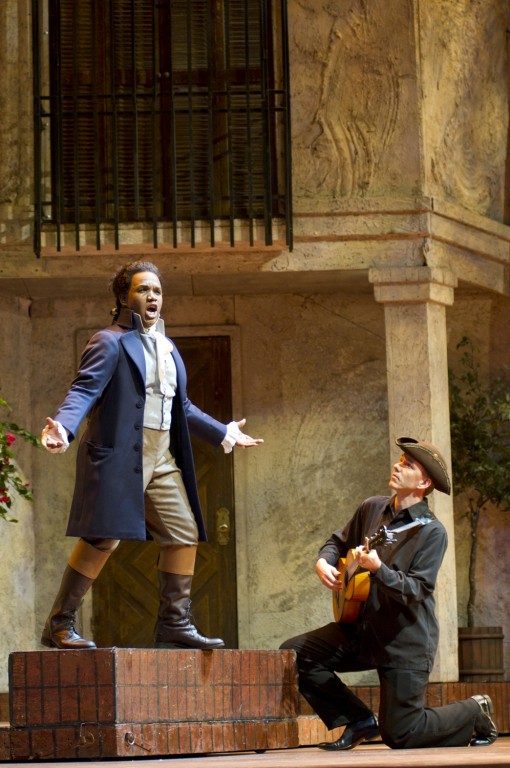Seattle Opera serves up a delightful “Barber”

Lawrence Brownlee (Count Almaviva) and Michael Partington (guitar) in Seattle Opera's "Barber of Seville." Photo: Rozarii Lynch
Lawrence Brownlee stakes an impressive claim to the title of “world’s pre-eminent Rossini tenor” in Seattle Opera’s current, fast-paced production of Rossini’s The Barber of Seville. A longtime Seattle favorite who got his operatic start in this city, Brownlee has refined and honed his craft to an impressive level of finesse; he also has trimmed down physically, and now cuts a compelling figure on the stage. His sheer vocal facility and accuracy in blisteringly fast passagework knocks listeners back in their seat. And he’s become a terrific comic, too, with some turns in the “singing lesson” scene that reduced Seattle Opera audiences to roaring laughter.
Brownlee has plenty of company at the top in this speedy show, which flies by under the deft leadership of conductor Dean Williamson. Williamson knows how to apply the accelerator and how to channel the musical energy to maximum effect, whether it’s with the orchestra, the soloists, or the enthusiastic chorus. The score is cannily knit together by Williamson’s continuo work on a period-replica fortepiano, an instrument with a light, plangent sound just right for this music.
You know this is going to be an imaginative show when Figaro (portrayed with considerable verve by José Carbó, in his U.S. debut) rises from his chair in the house after the last notes of Almaviva’s Serenade die away, and strolls to the stage to set the comedy into motion. It’s a move that is highly appropriate considering his role as “factotum” in the affairs of all the players. This is the first in a series of equally clever moves by stage director Peter Kazaras, who underscores the humor of the plot with all kinds of telling details (including intricate choreography for the whole cast).
Carbó swaggers around the stage as if he owns it, as a good Figaro should. He’s handsome, charismatic, and utterly assured, with a beautifully produced baritone that has a surprisingly easy top (he matches the tenor in several passages). He’s also a good ensemble member, working well with the other singers and not merely doing his own star turn.
The production boasts an elegant, witty soprano Rosina in Sarah Coburn, whose voice is equally compelling in the low notes of Una voce poco fa and the optional high D’s which glitter and blossom at full voice. Coburn is one of the few singers who can match Brownlee’s facility with lightning passagework, providing more ornaments than the White House Christmas tree. She’s also an adroit comedienne and a remarkable beauty: the very model of a Rossini heroine.
Patrick Carfizzi pours on the bluster as Doctor Bartolo, but he also commands a resonant sound and a terrific instinct for comedy. His timing was spot-on, even on opening night, whether he was mimicking the other singers’ lines in a stratospheric falsetto or interrogating Rosina. Burak Bilgili made an effective Don Basilio, and Sally Wolf (a Seattle Opera regular) made the most of Berta’s aria. Daniel Scofield, David S. Hogan and Adrian Rosas did well in supporting roles.
Originally designed for the Canadian Opera Company by John Stoddart, the effective set revolves to display the exterior of Dr. Bartolo’s house, then the interior. Clever lighting by Duane Schuler gives us a storm scene in which projections show first an umbrella, then a bicycle, then a spotted cow flying by in the high winds.
Adding to the snap and precision of this show, with choreography by the imaginative Rosa Mercedes, Kazaras provided the cast with sharply executed, simultaneous maneuvers and gestures that focused the comic punch of a memorable Barber of Seville.
Seattle Opera’s production of The Barber of Seville continues at McCaw Hall through January 29. An alternate cast of Kate Lindsey, Nicholas Phan and David Adam Moore performing January 16, 21, 23 and 28. For tickets and information, call 206-389-7676 or visit seattleopera.org.
Melinda Bargreen has been writing about classical music in Seattle for 36 years, 31 of those as the music critic for The Seattle Times. Also a composer, she contributes to KING-FM Radio, Symphony Magazine, The American Record Guide, MUSO Magazine, and MusicWeb International, as well as The Classical Review.
Posted Jan 17, 2011 at 3:47 pm by Jack Firestone
Melinda was spot on in her review of this marvelous, and in many places, laugh-out-loud production. Smiling throughout, I was fortunate enough to be in the house both Saturday opening night and for the alternate cast Sunday matinee featuring the astounding Kate Lindsay, Seattle Opera’s artist of the year for 2010, cast as the mezzo-soprano Rosina. Her Rosina is a joy to behold, not only as a singer, but because of what she is able to communicate. She creates a Rosina with a complex and nuanced set of emotions and feelings; coy, then conniving, loving, stubborn, and demure. Her love interest as Lindoro (Almaviva) Nicholas Phan sang and acted with ardor and a clarion tenor voice. Figaro was sung with great aplomb by the animated David Adam Moore. The acting and interplay of Peter Kazaras’ fast-paced, lively production was even tighter in the second outing and just as engaging as was the orchestra under Dean Williamson.
Both casts sang with enormous strengths. I highly recommend making the effort to be in the house for this raucous production. For my take it was worth the 6 hour plane ride from Miami.
Jack Firestone
Miami, FL